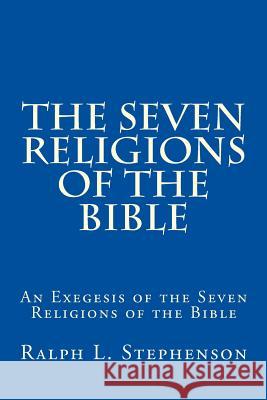The Seven Religions of the Bible: An Exegesis of the Seven Religions of the Bible » książka
The Seven Religions of the Bible: An Exegesis of the Seven Religions of the Bible
ISBN-13: 9781535176682 / Angielski / Miękka / 2016 / 142 str.
Virtually all commentaries on the Bible recognize that the Tanach or Old Testament is divided into Covenants whereby God changed his contract with humans from time to time. Also, nearly all Christian scholars recognize that there two religions in the Christian Bible, also known as the New Testament, and these are the religion of Jesus and the religion of Paul. This book recognizes the covenants for what they are, namely religions transmitted by God to humans. These religions teach morals and ethics and have economic import as morals, ethics, and economics are closely related. God has attempted, according to the Bible, to regulate how humans deal with one another, which directly relates to how they treat one another economically. In presenting the various religions or covenants it will be necessary to be more concerned with the theoretical framework given in the Bible rather than the actual functioning of the religious ethics and morals, since in many instances these were never observed diligently or at all. It has also been necessary to obtain an understanding of the history of the various periods from other sources to determine the background of the Bible and to shed light on what the Bible actually says. Many years ago I wrote the predecessor to this book and had it reviewed by a Professor of the New Testament and Greek at a local Bible college. He reviewed it and was quite impressed with the observations and analysis in the book. Then he said a peculiar thing, "You know, it is interesting that when a Christian reads the New Testament they never understand it, but when a Jew reads it they understand it immediately " I was taken aback by this statement so asked why. Then he said, "because a Jew understands the background and context within which it was written, but the Christian does not, and has all sorts of pre-conceived ideas which cloud their understanding." This book will give the context within which the various books of the Bible were written and therefore, hopefully, enhance the readers understanding. The end result of biblical studies should be a comprehensive understanding of the religions, covenants, morals, ethics and economics of the Bible. This book attempts to be totally logical, scientific, and subjective. It subscribes to no theory or tradition, rather analyzes the Bible for what it is and for what it literally says, and therefore and necessarily, takes a literalist viewpoint of the Bible. It views the Bible in the context of the times in which it was written. As a result, many views held by traditional scholars and religious leaders have been found to be inaccurate, and either are not in the Bible at all, or are misconceptions generated from lack of understanding of the background of the Bible. It should be noted that despite the fact that this book assumes the Bible is a literal book, it is, in fact, not. Much of the Bible is allegorical and metaphorical and has fictional stories intended to make a point. Indeed, most of Rabbi Yehoshua Ben Yusuf's teachings, better known as Jesus Christ, are in parables, fictional stories intended to make a point. He was obviously influenced by reading the Tanach, or the Hebrew Bible, also known as the Old Testament, which contains numerous fictional stories intended to make moral and ethical points. Traditional Christians and Jews may be shocked at the findings presented herein, indeed, many will call it heretical. Traditional Christianity and Judaism are not the religions of the Bible, most Jews know this but most Christians are deluded into thinking their theology and traditions come directly from the Bible. Much of Modern Christianity comes from pre-Christian religions such as, for instance, Christmas and Easter. However, free thinkers who are completely logical and rational and who accept scientific evidence and the scientific method will find this book fascinating.











